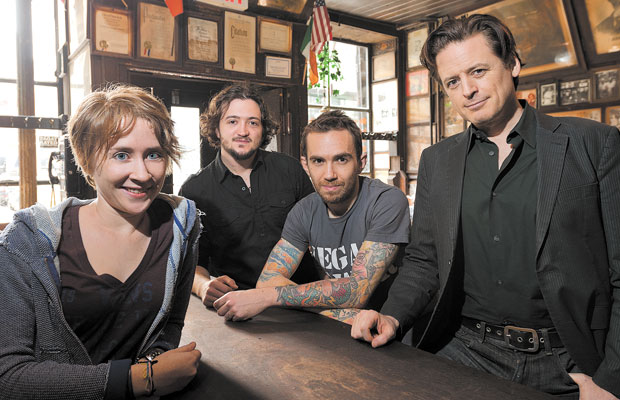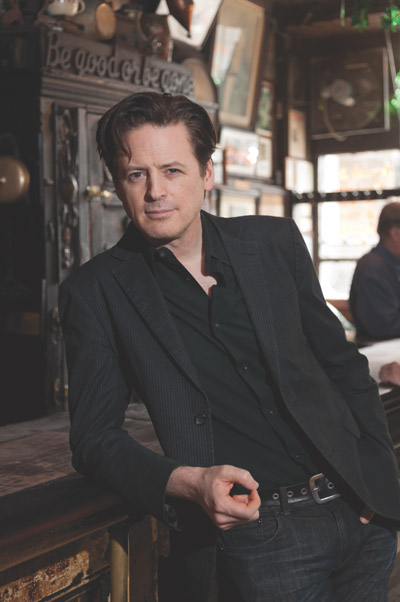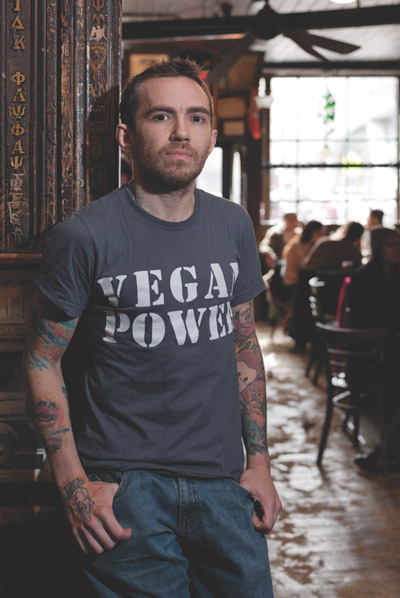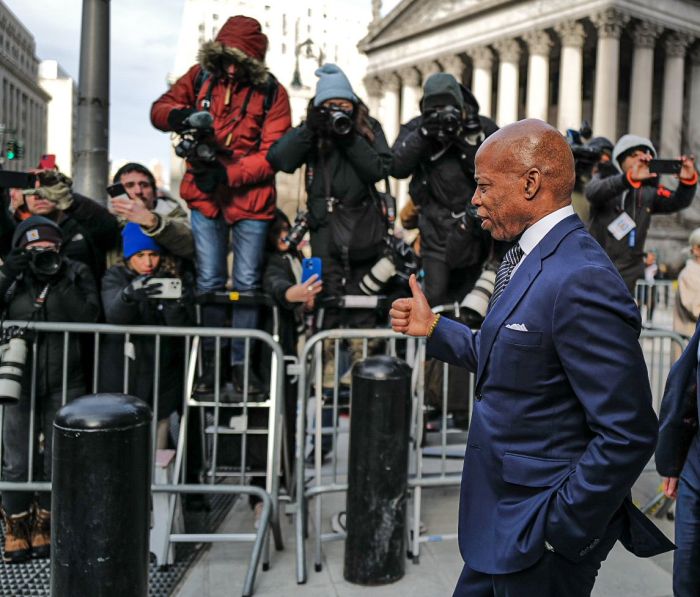
Before “binders full of women,” planning to fire Big Bird or calling “47 percent” of Americans irresponsible victims, failed Republican presidential candidate Mitt Romney and his camp unleashed the infamous Etch-A-Sketch analogy.
A year ago last month, John Fugelsang, the Setauket-native actor/comedian who hosts the Current TV political talk show Viewpoint, asked Romney’s chief spokesman the question on CNN that sparked the remark that haunted the flip-flopping former Massachusetts governor until November.
“Is there a concern that the pressure from [Rick] Santorum and [Newt] Gingrich might force the governor to attach so far to the right it would hurt him with moderate voters in the general election?” Fugelsang had asked Eric Fehrnstrom while both were guests on Starting Point with Soledad O’Brien.
Fehrnstrom, a tad too honestly for his own good, replied: “Well, I think you hit a reset button for the fall campaign. Everything changes. It’s almost like an Etch A Sketch. You can kind of shake it up and we start all over again.”
Twitter blew up. Etch A Sketches became a must-have accessory for Romney critics. The toy company’s stock soared. Although it was a serious Q&A on a straight news channel, the reply provided fodder for enough Mitt jokes to last through campaign season.
The quote ranked seventh on Yale Law School’s annual quotes of the year list, which “47 percent” topped. It was also the among the first Internet political memes in a presidential election year that was defined by public obsession with viral gaffes and one-liners.
Looking back on the kerfuffle, Fugelsang—a 43-year-old self-described “recovering cynic” inspired by comic social critic George Carlin—has mixed emotions. He’s amused he stirred up controversy, less so about his ensuing lesson in the backward priorities of national political broadcast journalism.
“The next day I went in and I said to a producer at CNN, ‘Hey, that was pretty cool we made international news about the Etch-A-Sketch thing,’ and this producer said back to me, ‘Yeah, we’ll never get him on the air again,’” Fugelsang recalls. “It was so depressing that they cared more about not getting access than the fact that they had the story of the year on the campaign trail.”
Nowadays on his show, Fugelsang makes fun of whatever public figures he wants without fear of retribution—a freedom afforded to him as a political comedian on a fledgling cable network. And he’s got company. He met with the Press recently at McSorley’s Old Ale House in Manhattan along with a crew of up-and-coming political satirists exposing awful truths with every punchline well after Election Day.
(Video contains mature language)
The Daily Show with Jon Stewart, The Colbert Report, Real Time with Bill Maher and The Onion may be the household names in satire. But as much as they’ve increasingly delved into comedic activism—Rally to Restore Sanity, anyone?—they’ve also got more competition now.
Born of mainstream media’s failure to adequately cover issues such as the legal fight over a law allowing indefinite military detention of American citizens, the explosion of the Internet and social media is enabling aspiring comics to reach countless fans from their homes. A public saturated with pop culture, viral headlines and YouTube videos are much more easily reached by a growing number of comedic activists—though, how many is impossible to definitely quantify—who are undoubtedly gaining more prominence and shaping the public dialogue about everything from corporate malfeasance and foreign affairs, to, as Fugelsang’s CNN appearance is testament, politics.
All have come a long way since Mineola-born Lenny Bruce’s obscenity convictions—the last of which, in 1965, a year before his death at age 40, New York State posthumously pardoned him for, just a decade ago.
Click Here: Behind the scenes photos of Long Island Press‘ interview with the four comedians
“Political comedy’s been around for a long time, satire in particular,” says Amy Becker, a Towson University professor who teaches a class in political humor. “There’s always a constant stream, it just picks up right before the election.”
Lewis Black, a comedian who skewers politicians on both sides of the aisle in his Daily Show segment, “Back in Black”—and who’s performing at NYCB Theatre at Westbury on April 26 and 27—recalls a time when he couldn’t get on TV because he was “too political.” He sees fake news programs like the one he appears on as a much-needed release valve for viewers with information overload.
“The reason The Daily Show and Colbert work is ‘cuz there’s …five cable outlets or whatever doing news, there’s like 7,000 hours of news a day. That kind of barrage created a need for some sort of insulation from the nonsense,” he tells the Press. “It’s kind of like at the end of the day, enough is enough.”

THEMS FIGHTIN WORDS
It’s a snowy recent Thursday night when the crowd settles into their tightly packed seats at the tiny EastVille Comedy Club in Manhattan to start their weekends early with a two-drink minimum and few cheap laughs amongst friends.
First comes the warm-up comedian, who works the crowd with reliable jokes about who’s from where, why those places suck and who’s dating whom in the room. After a self-deprecating monotone act and a self-congratulatory narcissist get things rolling, a scruffy Lee Camp storms the Subway-stop-styled stage and unleashes a diatribe.
“We just need an obesity exchange program,” the 32-year-old Washington, D.C. native says, channeling anti-establishment comic Bill Hicks. “We should take some of our little land manatees and ship them over to some of the Third World countries and then they could send over some over their heroin-chic kids and then we can fatten up their kids with our traditional diet of deep-fried skittles and chocolate-covered butter … and then our kids would slim down on the traditional Bangladeshi diet of sticks and sticks. Then once they’ve changed in weight you could ship ‘em back, globalize the fat, share the love handles.”
At one point he pauses, pulls a notepad out of his pocket and reads an observational, apolitical crowd-pleasing one-liner: “Have you ever noticed that acorn and unicorn both mean one corn?”
Although delivered in the stream-of-consciousness cadence of a street corner doomsday preacher, Camp’s on-stage act is relatively tame compared to his Moment of Clarity podcast—a sort of investigative rant on topics such as the evils of fracking, Wall Street greed and perpetual war, using comedy as a Trojan Horse for the infiltration of harder-hitting realities.
“Over 13 years ago the only trial ever held concerning the murder of Martin Luther King Jr. was concluded—and no, it wasn’t done in someone’s basement under the cover of tinfoil hats,” he says in a Feb. 4 edition while expressing outrage at the lack of common knowledge about the verdict. “The jury took less than an hour to decide that … multiple government agencies were responsible for the murder [and] James Earl Ray, the man who we’ve always been told pulled the trigger, had nothing to do with it.”
While true and reports in The New York Times and The Washington Post from the time noted the absurd lack of attention the case received, it’s important to note that it was a civil trial, where the burden of proof is a preponderance of evidence, rather than the higher standard of proof beyond a reasonable doubt in criminal court. The verdict also far from resolved the conspiracy theories. The FBI’s King files are sealed until 2027.

Standing at McSorley’s bar with a mug of their dark lager in one hand and tattoo on his forearm revealing a Howard Zinn quote—“small acts, when multiplied by millions of people, can change the world”—Camp gets serious for a moment to reflect on how he wound up in this line of work.
“The average person is dealing with far more information than we’ve ever had before,” he says. “Even if you claim to be apathetic or you claim to not read news articles, you’re still online getting endless amounts of information, and comedy is a great shortcut or a great way to get past the clutter and to get people to forward it to their friends and think about it.”
At another point in our conversation, Camp contemplates performing more widely accessible material, then dismisses the idea when considering the fork in the road the nation is generally believed to be facing.
“As a comedian, it could be so much easier to take a path … that didn’t offend so many people, that didn’t push people to things they don’t want to think about,” he says. “And it would be easier. But I feel like we’re in such a crucial time … it’s like, how can you not be talking about this?
“My skill, my talent, is getting people who would violently disagree with me to continue listening to me and continue enjoying the show,” adds Camp.
ROGUE COMICS
Joining the conversation at McSorley’s are two more stand-up comedians who, like Camp, have taken to podcasting their sardonic takes on under-reported news and mainstream media bias.
Jamie Kilstein founded Citizen Radio—“Like CNN but with more swearing”—with his wife, Allison Kilkenny, while Molly Knefel co-hosts the likeminded Radio Dispatch with her brother, John. Both shows are unapologetic in their activism and have a clear sense of mission.
“Comedy is really an amorphous, complex beast that is hard to distill,” says Knefel, an upbeat, sprightly feminist with cutting wit. “We’re in a moment where political satire, political comedy, is more able to provide more criticism than mainstream journalism outlets…because mainstream journalism outlets have no objectivity—they are married to the very corporations that they could be criticizing. So comedy does have an opportunity to provide that criticism.”
The 27-year-old Iowan-turned Brooklynite says she’s also got an uphill personal battle working against the stereotype that women aren’t funny—even from her colleagues.
“I get teased a lot from comedians for being feminist because the stereotype is that feminists aren’t funny and I get teased for being too political or too sincere,” she says.
Kilstein, 31, originally from New Jersey, is among the male political comedians that back Knefel—and he has no shortage of venom for her detractors or the likes of fratty funnyman Daniel Tosh, host of Comedy Central’s Tosh.0, whose rape jokes got him in hot water last summer.

“There’s nothing edgy about defending the patriarchy—that’s the most fucking generic thing you can possibly do,” Kilstein says. “Oh, finally someone stuck up for men,” he says sarcastically, then adds, “It’s like, go fuck yourself.”
His rant illustrates a larger point. It’s the difference between telling jokes relying on the status quo—hackneyed jokes about racial stereotypes, for example—and doing clever bits challenging authority that sets the satirists apart from other comics.
“Good comics have shitty lives and they use comedy as a defense mechanism or as a weapon and it’s a way for the little guy to take down the powerful,” continues Kilstein. “If you’re standing up for the oppressor you can’t be funny, you’re boring.”
“You know if you can make people who disagree with you laugh, it’s really disarming. And once they’re disarmed you can start to cram your agenda down their throat!” he adds.
Consensus in the quartet at McSorley’s is that comedy should attack up, not down. The admittedly left-leaning group is hard-pressed to find a comparable satirist on the right, when the conversation turns to Dennis Miller—a self-described libertarian who was perceived as liberal early in his career and now is a Fox News Channel contributor.
“When you have someone coming from a place of power making fun of those who don’t have power or don’t have money, it’s very hard to laugh at,” says Camp. “For me, a case in point is Dennis Miller, who I loved when he was in the middle…I find him hard to listen to now.”

CROWD WORK
Trying to count just how many more political comics are delving into activism is as futile a task as answering a knock-knock joke. But, there are as many anecdotal examples of satire blurring the lines with politics and activism as there are chickens that have crossed the road.
U.S. Sen. Al Franken (D-Minn.), a longtime Saturday Night Live writer and performer who unseated Republican Norm Coleman in 2008, may be the most high profile—writing the laws being the ultimate form of activism. Libertarian comic/perennial candidate Randy Credico has thrown his hat in the ring for New York City mayor. And two months ago, comedian Beppe Grillo, the “clown prince” of Italian politics, proved his Five Star Movement party a force to be reckoned with in that nation’s parliament.
While the list of American comedians to have run for office—jokingly or not—is longer than open-mic night at Brokerage Comedy Club in Bellmore, faux conservative pundit Stephen Colbert upped the comic activism ante last year when he put his viewers’ money where his mouth is and launched a SuperPAC, Americans for a Better Tomorrow, Tomorrow. He then used the funds to air satirical commercials in early presidential primary states.
The Daily Currant, an online satirical newspaper, launched last year—hilariously duping some unwitting readers into believing their stories—includes links to nonprofit organizations to encourage civic engagement. They’re competing with The Onion, which grew from a newspaper into The Onion News Network on IFC in 2011.
Citizen Radio likewise encourages its listeners in various ways to get involved with organizations it’s aligned with, such as Occupy Wall Street, Food Not Bombs and Veterans for Peace.
Becker, the Towson professor, published a study in November exploring how various types of satire can sway perceptions of political candidates. The study compared 400 college-aged viewers’ reactions to Colbert mocking U.S. Sen. John McCain (R-Ariz.) in his 2008 presidential run versus the senator’s self-satire in an SNL appearance.
“Exposure to political comedy can have a significant impact on political evaluations and attitudes but…this impact depends in part upon the type of comedy presented,” Becker wrote in her analysis, adding that the Colbert bit had more of an effect than the SNL skit. She noted, “It is possible that subjects may have found both clips to be purely funny and nothing else.”
It’s not just academics taking Stewart and Colbert’s brand of satire seriously. Last month, the Republican National Committee released its Growth & Opportunity Project, which the GOP dubbed its “autopsy” report detailing how to rebound from its 2012 election losses, suggesting that “Republican leaders should participate and actively prepare for interviews with The Daily Show, The Colbert Report, MTV and magazines…”
Colbert mockingly welcomed the news on his March 26 episode. “If you come on my show, you will reach the youth,” he said. “Or as I call it, ‘You’ll get youth-anized.’”
SATIRISTAS
While many in the satire business agree that it’s a field dominated by liberals, for the most part, they’re equal-opportunity offenders.
“The problem with the left as comic fodder is that the Democrats are dumb and the Republicans are stupid,” says Lewis Black, recalling one of his bits. “Dumb isn’t funny, stupid is.”
Miles Kahn, a Northport native and producer for The Daily Show, admits that former President George W. Bush was a better target, but it was inevitable that President Barack Obama would wind up the butt of jokes, too.
“If you’re gonna make fun of politics, you should make fun of everything,” he says. “The idea that we wouldn’t be able to find comedy in the leader of the free world? He’s gonna say stupid shit, just like everybody else.”
Observers agree that sometimes bias is in the eye of the beholder.
“There’s more humor to be found in the Republicans,” says William Horner, a professor of political science at the University of Missouri who studies satire. “That leads people to believe there’s a left-leaning bias. It’s really just looking for the joke that they think are gonna make people laugh.”
Molly Knefel of Radio Dispatch adds that conservatives have especially made themselves targets with their controversial policies regarding female reproductive rights. “It takes a certain amount of male privilege to say the two parties are the exactly same because the Republicans weren’t coming after the penises!”
Camp and his cohorts wouldn’t mind getting an audience like The Tonight Show with Jay Leno, for example, but they wouldn’t want to betray their politics to get there.
“You could argue that Jay Leno talks about the issues of the day,” says Camp, “but I don’t want to do Jay Leno because I don’t think he actually cares about the issues he’s talking about or has a point he’s trying to make. He’s just joking.”
Fugelsang, who joined Current TV just in time for its founder, former Vice President Al Gore, to sell it to Al Jazeera—a move that “will surely shake up the way we do media here,” Gore told the Long Island Association last month—takes pride in offending all sides.
“If I can go out there and do a really political set and get a mixed audience of conservatives and progressives laughing, it’s a very special emotional victory,” he says, noting that he makes fun of liberals first to give himself cover to mock conservatives later. “Because if you take on the two-party system, it’s a lot easier.”
Fugelsang sees his role in Shakespearean terms. “You can’t make them laugh without an element of truth, which is why I think by the end of the play the only one that King Lear trusts is the fool.
“Comedy is that spoonful of sugar that makes the medicine go down.”






























